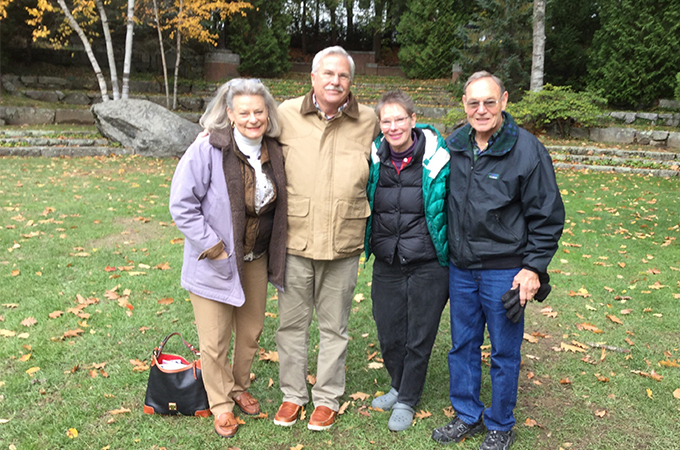Does being a “Bulldog for Life” matter beyond the degree?
Could we have answered this question 40 years ago? No. Can we now? Oh yes. We have been friends since we met on the University of Redlands’s fall Salzburg semester in 1974. Herr Peter Madler led us and Professor of Religion Clarence (Uppy) Downing assisted. Any qualms about having a professor of religion on our faculty dissipated shortly after meeting the pair—although they seemed ancient, they were interesting and fun people with whom we spent a lot of time.
The 1974 cost of going to Salzburg was a whopping $800 extra for the semester. A bargain we recognized even then. New foods and drinks to sample, three two-week tours around Europe, people with life experiences different from our own, and life with fellow students 24/7 … all of this made for an experience we’ve both agreed can never be replicated.
After graduation, we kept in touch. We both attended law school in Oregon. Our stays overlapped for two years. We lived 60 miles apart and met for dinner occasionally. In the early years, we lost people who were dear to us from our Salzburg group due to malaria, MS, and AIDS. Mark played cribbage with Sue and her first husband the night before Sue’s daughter was born in 1982. Sue was there when Mark married Leslie Potter ’76 in 1983. Beyond that, we fell into a pattern of annual holiday greetings. Mark lives in California and Sue in Maine, and, until October 2018, we hadn’t met in person for more than 25 years.
But this backstory turned into a different narrative in 2017. Sue developed breast cancer in 2015. The unwelcome diagnosis was received in August atop Monchsberg at the Pallotiner Brothers’ Inn a few yards from the current Salzburg student residence and during a Salzburg alumni trip (the brothers being our U of R residence landlords). A more peaceful place to begin processing this life change cannot be imagined. Chemotherapy, surgery, and continuing treatment followed. Mark was diagnosed with colon cancer in 2017, with his own chemo, surgery, radiation, and further issues. THIS is where our histories converge.
We speak on the phone (at length!) every few weeks and have done so for three years. Our relationship and the strength we derive from it likely makes little sense to anyone not on this particular journey. Were it not for the depth of our friendship more than 40 years ago, we wouldn’t have been able to discuss matters of life, death, and the meaning of it all with anything beyond the superficial platitudes that have become the standard of modern discourse. It’s not a warm and fuzzy story, but it’s ours, and we are comfortable as guides to each other … not hesitant to speak about fears for the uncertain future we each face. We don’t need filters. As Mark puts it, “as an end-of-life situation, I never thought I’d be having this conversation.” Sue thinks of this shared experience as an unexpected silver lining to living with cancer.
Neither of us knows what health or longevity (or not) lies ahead. Who does? What we do know is that were it not for the friendship begun all those years ago, we wouldn’t share the precious bond we so value today. Life didn’t turn out the way we’d planned. You may, like us, find that well on down the road of life, your time at Redlands and the friendships and memories forged there make a world of difference. Wonderful things may come out of your Redlands experience, too, perhaps when you least expect them. We hope so. Be open to the possibilities, we say.
Learn more about the University of Redlands and its Alumni and Community Relations.






